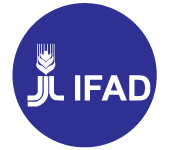International Fund for Agricultural Development (IFAD)

Tel: +39 06 5459 1,
Fax: +39 065 04 3463
E-mail: ifad [at] ifad.org (ifad[at]ifad[dot]org)
Web: www.ifad.org
Via Paolo di Dono, 44
00142 Rome, Italy
A specialized agency of the United Nations and an international financial institution, IFAD was established in 1977 as one of the major outcomes of the 1974 World Food Conference. The conference resolved that “an International Fund for Agricultural Development should be established immediately to finance agricultural development projects primarily for food production in the developing countries.”
IFAD’s mandate – improving rural food security and nutrition, and enabling rural women and men to overcome poverty – has never been more relevant. Nearly a billion rural people are living on less than US$1.25 a day. Across the globe, there are about 500 million smallholder farms supporting approximately 2 billion people. In some countries, agriculture is the main source of income for 70 percent of the rural population.
Working with rural poor people, governments, donors, non-governmental organizations and many other partners, IFAD focuses on country-specific solutions, which can involve increasing rural poor peoples’ access to financial services, markets, technology, land and other natural resources.
The Strategic Framework guides IFAD's activities for IFAD 2016-2025. IFAD’s overarching goal is to invest in rural people and overcome poverty and food insecurity in the rural areas through remunerative, sustainable and resilient livelihoods. Despite the challenges, new opportunities are emerging both on and off the farm, and the organization’s role is to help people prepare themselves to exploit them. Rural areas are becoming more dynamic places. IFAD-supported programmes will pursue the following strategic objectives:
-
Increasing poor rural people’s productive capacities in a sustainable and resilient manner;
-
Increasing and improving their engagement in markets, while enabling them to better manage related risks; and
-
Strengthening the environmental sustainability and climate resilience of their economic activities
All of IFAD’s decisions - on regional, country and thematic strategies, poverty reduction strategies, policy dialogue, and development partners - are made with these principles and objectives in mind. IFAD is committed to achieving the Sustainable Development Goals, in particular, the target of eradicating extreme poverty, ending hunger and malnutrition by 2030.
For more information: https://www.ifad.org/topic/overview/tags/sdgs
Selected TCB programmes and initiatives in this guide
IFAD has 40 years of experience in meeting the challenges of rural poverty reduction. Over this time IFAD has provided over US$18.5 billion in loans and grants to developing countries for agriculture and rural development programmes and projects, and to support agricultural research. With co-financing from partners and domestic contributions, the total investment is about US$44.6 billion. These initiatives have reached about 464 million poor rural people in 123 countries and territories.
For more information: http://www.ifad.org/story/index.htm
Partnerships have been essential to IFAD’s business model since the organization’s founding as a three-way partnership among the Organisation for Economic Co-operation and Development (OECD), the Organization of the Petroleum Exporting Countries (OPEC) and other developing countries. Agenda 2030 brings the critical importance of partnerships – both global and within countries – into sharp relief. IFAD fully recognizes the magnitude of the investments required for smallholder agriculture development and rural transformation. Partnerships will be crucial for promoting synergies of finance, knowledge, and expertise, and thus creating, enabling environments for poor rural people to build their pathways out of poverty.
IFAD will engage with a broad range of partners: The Member States, development institutions, farmer organizations, the private sector, foundations, and other relevant national and international stakeholders.
IFAD developed a partnership strategy, which was reviewed by the organization’s Executive Board in September 2012. IFAD also seeks to consolidate and expand the use of multi-stakeholder approaches such as the recently articulated public-private-producer partnerships mechanism to build mutually beneficial partnerships between the public sector, the private sector, and small-scale rural producers.
